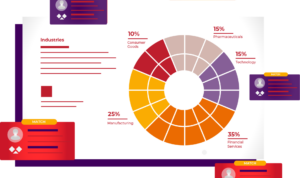We live in an increasingly connected, complex world where businesses are being tasked with being more transparent than ever. The differing pressures of Environmental, Social and Governance (ESG) agendas, political polarisation, stakeholder activism, digital take up, decarbonisation and inclusion mean that the CEO of today has to tread carefully and at the same time be brave in building a sustainable, thriving business – no business shrinks to greatness!
Against this backdrop, corporate reputation has never been more important – accounting for at least 25% of a company’s market value (according to the World Economic Forum). It can take twenty years to build a good reputation, and just five minutes to destroy it.
In order to navigate this reputational maze, we spoke to a selection of CEOs within the Industrial sector at a series of lunches about what key themes and initiatives they will be focusing on in 2020.
ESG (Environmental, Social and Governance)
ESG is essential for good long-term business but many CEOs (and Boards) lack knowledge and expertise in this area. There are rising expectations from (some, not all) investors, consumers and stakeholders alike, and the genie is out of the bottle. There is a learning curve to climb. The tone from the top has never been more important nor has the questioning from the bottom. Companies need to embed a purposeful culture that also articulates the ESG value proposition. People want to be proud of their organisations and want its purpose, mission and culture to reflect their values.
Climate Change
Society is driving significant change, however the pace will be dictated by the sacrifices people are prepared to make and replacement cost. There is no quick fix to suit all; OECD agendas and scope to change differ considerably from emerging markets. What is possible in the richest nations can be irrelevant in other parts of the world. The energy equation coupled with how we wish to live and what legacy we want to leave is a lot more complex that most people (and commentators) appreciate.
Happy Employees Make A Difference
Diversity and Inclusion, mentoring and succession planning are not new to the CEO agenda – but there’s a long way to go for organisations to truly make this part of their business. Reverse mentoring – where young people give guidance to the leadership team is one approach to help embed a listening culture. This is a growing process. Initiatives across wellness, impact of AI and addressing gender issues are just a few examples. People engagement is arguably the ‘heart beat’ of an organisation. People will only respond if they are engaged. Therefore, tailoring the right messaging, communications, appraisals and actions to differing genders, cultural backgrounds and demographics builds trust and open relationships.
The Digital Shift
Asset ‘heavy’ industrial B2B businesses are just beginning their digital journey and can learn a lot from the experiences of other industries and B2C businesses, who are now competing with the likes of Uber, Airbnb, Spotify etc. Differing strategies abound, organisations will need to decide whether to be first movers, first to scale, fast adapters or do nothing. In addition, determining what skill sets are best to deliver this change will set companies apart. During the Apollo programme era the average age in Mission Control was 28 and at that time technology was pushed to its limits, uncertainty had to be dealt with and solutions found. Today is no different; the digital world breaks down old beliefs, barriers and processes. Age is immaterial; success will be built upon relevant technical application, adaptation and open thought. Our recent ‘Transforming for Tomorrow’ report measures the rate of digital transformation among industry incumbents and provides suggestions for how to prepare and succeed on an organisation’s digital journey .
In Conclusion:
2019 is turning out to be a pivotal year driven by significant geopolitical agendas which are shaking up markets across the world with wide ranging ramifications. Maybe upsetting the status quo is not such a bad thing, as it acts as a catalyst for change. Next year is gearing up to be no less eventful. Against this backdrop, we know that considered and rational thought wins the day even after initial emotional reactions. In consequence, this is time for organisations to grow their ambitions and build greatness.
If you are interested to join our 2020 CEO Industry lunches and join in the discussion, please contact Chris Donkin at: cdonkin@savannah-group.com




